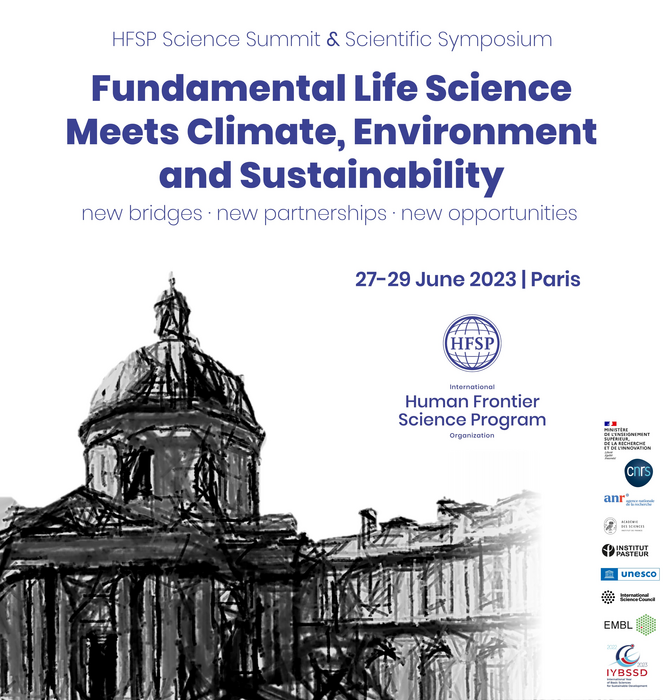The International Human Frontier Science Program Organization (HFSPO) and its partners will host Fundamental Life Science Meets Climate, Environment and Sustainability, a Science Summit and International Scientific Symposium which will be held 27-29 June 2023 in Paris.

Credit: HFSP
The International Human Frontier Science Program Organization (HFSPO) and its partners will host Fundamental Life Science Meets Climate, Environment and Sustainability, a Science Summit and International Scientific Symposium which will be held 27-29 June 2023 in Paris.
The events are designed to build bridges at the public policy, academic, and science funding levels and demonstrate how basic life science research can partner with environmental science to accelerate the sustainability transition.
Ministers from around the world, top scientists, policymakers, and others will participate and present research focused on the following four themes:
-
Climate Change and Health
-
Ocean Biodiversity and Resources at Risk
-
Food Security in a Changing World
-
Individuals, Institutions, and Society – the Need for Diversity, Equity and Inclusiveness Transformations
Registration is now open online (registration link). Scientists interested in being considered for presenting their research in four major categories are invited to submit abstracts on the HFSP digital submission portal. Deadline for abstracts is 30 April 2023. Registration to attend the events will remain open until seats are filled or until 30 May 2023.
The Science Summit will be held in the afternoon on 27 June 2023 at the French Academy of Sciences located at 23 Quai de Conti, 75006 Paris, France. The two-day symposium, will be held 28 & 29 June 2023, 3 Rue Mazarine, 75006 Paris, France, which is proximate to the Academy of Sciences.
The events are jointly organized by: the Ministry of Higher Education and Research of France, the French National Research Agency, the French Academy of Sciences, the French National Centre for Scientific Research, the Pasteur Institute, the International Science Council, the European Molecular Biology Laboratory, UNESCO and the U.N. International Year of Basic Sciences for Sustainable Development.
The United Nations (U.N.) Agenda for 2030 identifies climate change, biodiversity, oceans, health, and other sustainable development goals as major challenges in the 21st century. Profound scientific understanding is key to creating the policies and solutions humanity must have for a transition to a sustainable future. However, scientific communities don’t often collaborate to address these challenges. This is especially true of basic life science, which has not been connected to the sustainability discourse, as those conversations have traditionally been the domain of environmental science. To better connect basic life research to climate change and other sustainability challenges, the U.N. General Assembly declared 2022-2023 to be the U.N. International Year of Basic Sciences for Sustainable Development, (IYBSSD).
####
The Human Frontier Science Program was founded in 1989 to advance international research and training at the frontier of the life sciences. Its aims are to promote intercontinental collaboration and training in cutting-edge, interdisciplinary research focused on the life sciences. HFSP receives financial support from the governments or research councils of Australia, Canada, France, Germany, India, Israel, Italy, Japan, the Republic of Korea, New Zealand, Norway, Singapore, South Africa, Switzerland, the UK, the USA, as well as from the European Commission. With its collaborative research grants and postdoctoral fellowships, the program has issued over 4,500 awards involving more than 7,500 scientists from all over the world. Since the beginning of the Program, 28 HFSP awardees have gone on to win the Nobel Prize.




